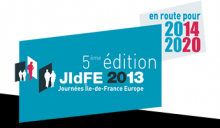Uwaga
Ten artykuł pochodzi z archiwum serwisu WWW i może nie spełniać kryteriów związanych z dostępnością definiowanych przez standard WCAG2.1AA.
There is no denial that culture plays a crucial role in a successful development of a region. That is probably why the first day of this year’s Île-de-France Europe Days was devoted precisely to that – culture, creativity and cinema. The event consisted of two main panels – one discussed supporting culture and cultural and creative industries in years 2014-2020 with focus on the role of the local authorities, and the other based on the question of supporting the audiovisual production in 2014-2020.
The first session opened with presenting the new “Creative Europe” programme, which should help to maintain creativity and diversity, and later use the potential of the region. The programme aims at promoting linguistic diversity and reinforcing competitiveness; its assumptions include strengthening the position of rendered texts and, since the cultural sector covers so many other areas and scopes of interest, creating new work places. What is worth mentioning, that the initiative can be joined not only by the member countries, but also by the neighbouring ones.
During the second panel, the MEDIA sector of the
Creative Europe” programme was presented in more detail. This session also features presentation related to the condition of regional cinema industry, namely from France and Belgium. The speakers often referred to the heritage and history that comes with the European cinema, mentioning names such as Georges Méliès and Michael Haneke. The occurring topics were also the cooperation between the regions, and the regional cinema in the context of international film industry.
There is no denial that culture plays a crucial role in a successful development of a region. That is probably why the first day of this year’s Île-de-France Europe Days was devoted precisely to that – culture, creativity and cinema. The event consisted of two main panels – one discussed supporting culture and cultural and creative industries in years 2014-2020 with focus on the role of the local authorities, and the other based on the question of supporting the audiovisual production in 2014-2020.
The first session opened with presenting the new “Creative Europe” programme, which should help to maintain creativity and diversity, and later use the potential of the region. The programme aims at promoting linguistic diversity and reinforcing competitiveness; its assumptions include strengthening the position of rendered texts and, since the cultural sector covers so many other areas and scopes of interest, creating new work places. What is worth mentioning, that the initiative can be joined not only by the member countries, but also by the neighbouring ones.
During the second panel, the MEDIA sector of the
Creative Europe” programme was presented in more detail. This session also features presentation related to the condition of regional cinema industry, namely from France and Belgium. The speakers often referred to the heritage and history that comes with the European cinema, mentioning names such as Georges Méliès and Michael Haneke. The occurring topics were also the cooperation between the regions, and the regional cinema in the context of international film industry.
More information here.
